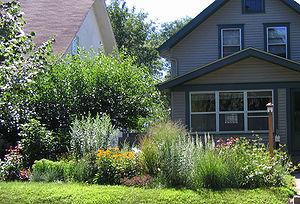
Difference between revisions of "Plant and vegetation information for stormwater management"
| Line 1: | Line 1: | ||
| − | {{alert|We are expanding information on plants and vegetation on this website. We anticipate populating this gradually in the coming years|alert-info}} | + | {{alert|We are expanding information on plants and vegetation on this website. We anticipate populating this gradually in the coming years. This information is subject to change as we build the websites.|alert-info}} |
{{alert|Vegetation is a fundamental component of [[Green Stormwater Infrastructure (GSI) and sustainable stormwater management|green stormwater infrastructure]] practices. Vegetation provides numerous [[Multiple benefits of green stormwater infrastructure|stormwater benefits]], but also can provide additional benefits such as carbon sequestration, improved biological habitat, and aesthetic value.|alert-success}} | {{alert|Vegetation is a fundamental component of [[Green Stormwater Infrastructure (GSI) and sustainable stormwater management|green stormwater infrastructure]] practices. Vegetation provides numerous [[Multiple benefits of green stormwater infrastructure|stormwater benefits]], but also can provide additional benefits such as carbon sequestration, improved biological habitat, and aesthetic value.|alert-success}} | ||
[[File:Native landscaping.jpg|thumb|300px|alt=photo of a rain garden planted with native vegetation|<font size=3>Example of a rain garden planted with native vegetation.</font size>]] | [[File:Native landscaping.jpg|thumb|300px|alt=photo of a rain garden planted with native vegetation|<font size=3>Example of a rain garden planted with native vegetation.</font size>]] | ||
Revision as of 14:27, 16 August 2022
Information: We are expanding information on plants and vegetation on this website. We anticipate populating this gradually in the coming years. This information is subject to change as we build the websites.
Green Infrastructure: Vegetation is a fundamental component of green stormwater infrastructure practices. Vegetation provides numerous stormwater benefits, but also can provide additional benefits such as carbon sequestration, improved biological habitat, and aesthetic value.
The Minnesota Stormwater Manual contains information on plants and vegetation, but this information is scattered in various places throughout the manual. Below is a framework we will be using to consolidate this information. At the bottom of this page you will find links to existing information on this website. Over time, the information on the existing pages will be incorporated into the framework shown below.
Contents
Vegetation overview
- Ecosystem, hydrologic, and water quality function of vegetation in stormwater BMPs
- Ecosystem function and benefits provided by vegetation in stormwater management
- Ecosystem function of vegetation in stormwater management
- Hydrologic function and benefits provided by vegetation in stormwater management
- Water quality function and benefits provided by vegetation in stormwater management
- General tools and resources for plant identification, quantification of the benefits plants provide and plant selection
Site planning and design
- Site assessment, preparation, design considerations and recommendations for vegetation in stormwater management
- Plant and seed selection based on project goals and site conditions
- Regulations, standards, and guidelines related to vegetation in stormwater management
- Operation and maintenance considerations for vegetation in stormwater management
- Construction considerations for vegetation in stormwater management
- Specifications for vegetation in stormwater management
Construction
Operation and maintenance
Existing pages and information on plants and vegetation
- Minnesota plant lists
- Plant lists for trees
- Plants for swales
- Pollinator specific plants
- Pollinator friendly Best Management Practices for stormwater management
- Top 10 reasons to plant pollinator friendly vegetation at your solar site
- Vegetation and plant guidance is incorporated into guidance on bmp design and bmp operation and maintenance. Design and O&M pages can be found at the following links.
